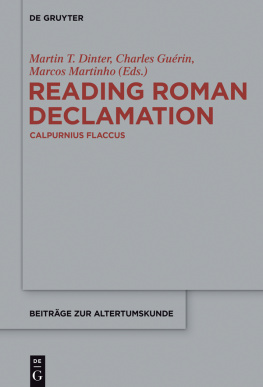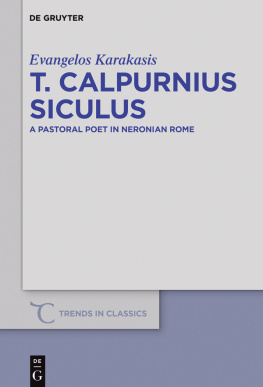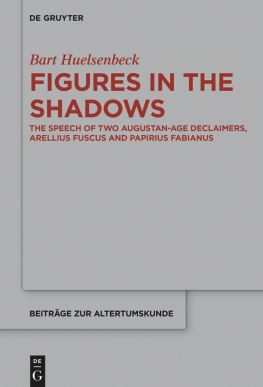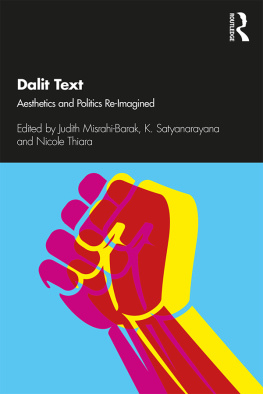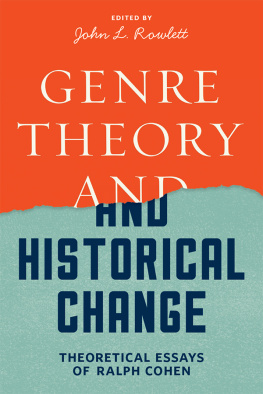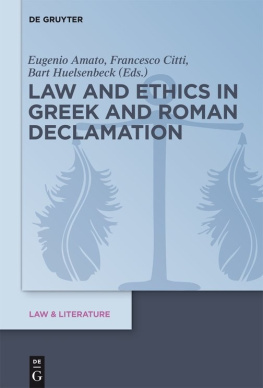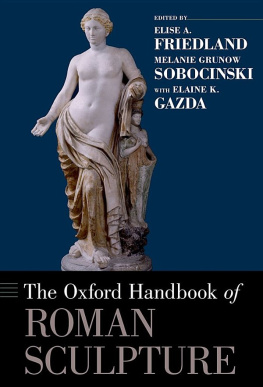Table of Contents
Guide

Reading Roman Declamation Calpurnius Flaccus
Beitrge zur Altertumskunde

Herausgegeben von Susanne Daub, Michael Erler, Dorothee Gall, Ludwig Koenen und Clemens Zintzen
Band 348
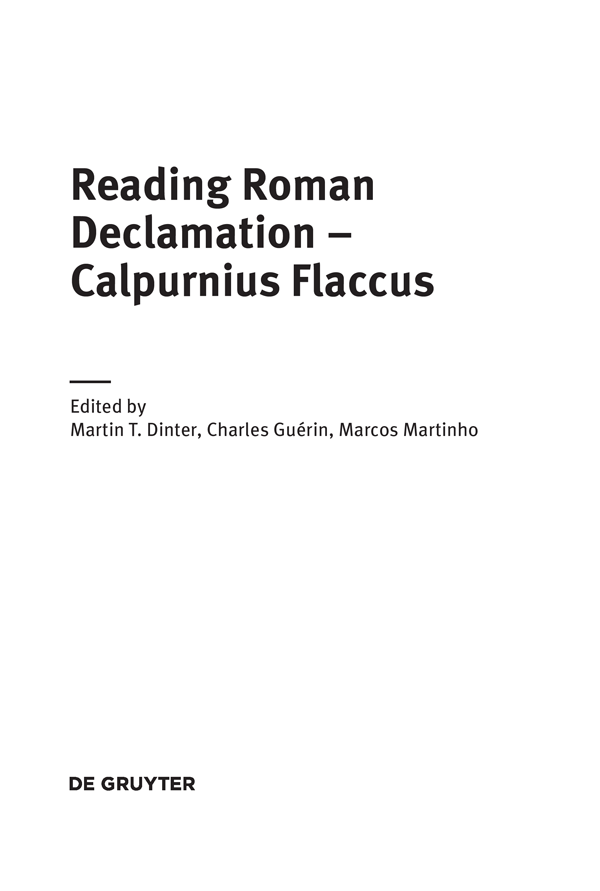
ISBN 978-3-11-040124-0
e-ISBN (PDF) 978-3-11-040155-4
e-ISBN (EPUB) 978-3-11-040163-9
ISSN 1616-0452
Library of Congress Cataloging-in-Publication Data
A CIP catalog record for this book has been applied for at the Library of Congress.
Bibliographic information published by the Deutsche Nationalbibliothek
The Deutsche Nationalbibliothek lists this publication in the Deutsche Nationalbibliografie; detailed bibliographic data are available on the Internet at http://dnb.dnb.de.
2017 Walter de Gruyter GmbH, Berlin/Boston
www.degruyter.com
Acknowledgements
The papers in this volume stem from a conference held at the Maison de la Recherche, Universit Paris-Sorbonne in February 2014, which has been generously supported by the Institut Universitaire de France.
Special thanks in the name of the co-organisers and all participants are due to Charles Gurin (UPEC), whose travails and organisational skills made this event possible gratias tibi agimus .
The present book is the second in a series of three edited volumes that showcase current research in Roman Declamation under the heading Reading Roman Declamation. A volume on Ps-Quintilian has appeared with De Gruyter in 2016, one on Seneca the Elder (OUP) will be published in 2018.
We would also like to thank the editors of this series as well as the editorial team at De Gruyter, Katharina Legutke and Mirko Vonderstein, for their swift, kind and professional co-operation. Antonia Ruppels and Astrid Khoos astute copy-editing has made life easier for all of us, many thanks to them. Astrid Khoo has also kindly compiled the index locorum and the index rerum for this volume.
Last but not least, we acknowledge with gratitude a significant contribution towards the production costs of this volume by the Institut Universitaire de France.
Martin T. Dinter (Kings College London)
Charles Gurin (Universit Paris Est-Crteil)
Marcos Martinho (University of So Paulo)
Martin T. Dinter and Charles Gurin
Introduction: Calpurnius a postmodern author?
Martin T. Dinter , Kings College London and Charles Gurin , Universit Paris Est-Crteil
Every generation of students has their particular frame of cultural reference of which those teaching make frequent use. We will find that in a similar way Roman declamation can rely on its audiences awareness of its generic conventions: pirates, ghosts, evil stepmothers, blind sons and violent tyrants people a world as weird as it is wonderful and provide ample fodder for teachers of rhetoric and their students. They discuss (in all seriousness) fictional court cases so as to provide training to future lawyers and display a firework of rhetorical skill. When read sociologically, rhetorical education fosters social reproduction and helps to shape a young mans attitudes and behavior; it teaches him how to be a Roman citizen. For he will train to navigate the Roman concept of patria potestas that gives a father overbearing legal power over the members of his family; he will argue with fictional tyrants rather than question the authority of actual emperors and thus find his place in imperial hierarchy; he will learn to sort out the social mess that transgressions such as rape cause and absorb the moral precepts and approved values of his peers. In addition, he will imbibe how to reinforce the poor-rich and the slave-free divide through the examples Roman declamation provides.
What is more, scholars have recently lavished their attention on Roman declamations controversiae (mock legal speeches) and suasoriae (mock speeches of advice, usually to some great man) and have allowed these genres to leave their neglected corners. Important studies by Gunderson (2003), Schrder (2003), Berti (2007), Frazel (2009) and Bernstein (2013) have placed declamatio centre-stage and illuminate social concepts such as authority, educational practices, cultural context or Roman jurisdiction. setti (2016) which concentrates on Quintilians minor declamations and Dinter, Gurin, Martinho (2016) showcase declamation as self-conscious literary genre, similarly to the volume in hand. Previously Gleason (1996) had smoothed the way for a recognition of rhetoric as the fashioning of the self, as a cultural process that facilitates not merely gender definition how to be a real man but also reinforces claims of paideia , Graecitas , Romanitas , and status. In addition, Beard (1993) ingeniously saw declamation as playing the role of myth in earlier Greek culture, in that it provides the source of storytelling Roman culture, and a space for the exercise of this cultures imagination.
Naturally, when placed into its socio-historical context the body of declamations that has come down to us (Seneca the Elder, Ps.-Quintilian and Calpurnius Flaccus) echoes its cultural, social and literary background. These texts are not independent and have to be read within their contexts, but at the same time they also constitute a genre on their own, the rhetorical and literary framework of which remains not yet fully explored. It remains to be asked: what are the poetics of declamatio?
As a genre situated at the crossroad of rhetoric and fiction, declamatio offers the freedom and ability to experiment new forms of discourse, and calls for both a technical and literary analysis. If one places the literariness of declamatio into the spotlight (van Mal-Maeder 2007) declamatio has been hailed by Bloomer as the first literary movement of the Roman empire (2007: 297) it becomes possible to study it as a realm of genuine literary creation with its own theoretical underpinning, rather than simply reading it as a gratuitous exercise mimicking the practice of real orators.
Of the three Roman authors whose declamations have survived, the corpus of Quintilian has attracted the highest degree of scholarly attention. The Cassino series of commentaries coordinated by Antonio Stramaglia has almost completed its task to provide a commentary on each of Quintilians Major Declamations . In addition Santorelli has made accessible to us Hkansons previously unpublished research on the Major Declamations and Santorelli, Stramaglia and Winterbottom are at present preparing a new Loeb edition of that very corpus . Berti (2007) and Migliario (2007) as well as Huelsenbecks Duke Dissertation (2009) and his substantial article (2011). In addition, we now also have Fedderns commentary on Senecas Suasoriae (2013), Huerta Cabreras UNAM Dissertation (2015) and most recently Lennart Hkansons posthumously published commentary on Controversiae book I edited by Citti, Santorelli and Stramaglia (2016). Finally, an edited volume with papers on Seneca the Elder stemming from our own Reading Roman Declamation project will appear in due course.
Calpurnius text is well served by an excellent Teubner edition. Apart from Sussmans commentary (1994), however, literary scholarship that focuses on Calpurnius Flaccus, as the present volume does, is almost entirely absent. Accordingly, the volume in hand certainly fills a lacuna in that it offers a point of entry to the relatively compact corpus of excerpta attributed to Calpurnius Flaccus. Consisting of just fifty-three short excerpts of declamations, Calpurnius oeuvre in many respects epitomizes Roman Declamation: it exemplifies all its traits and due to its relative brevity also provides a potted version of the genre. Therefore we hope that readers will accept our invitation to read Roman declamation as literature and not just as offering a convenient footnote when on the hunt for a reference on racial prejudice in antiquity (cf. Calp. 2).

